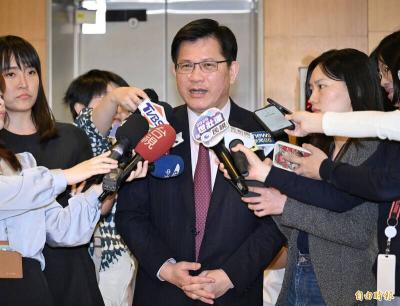A second round of negotiations on a proposed economic cooperation framework agreement (ECFA) with China is expected to open in Taipei on March 29, government sources said yesterday.
The sources said Chinese Vice Minister of Commerce Jiang Zengwei (姜增偉) was scheduled to arrive in Taipei on Thursday with Tang Wei (唐煒), head of the Department of Taiwan, Hong Kong and Macau under China’s Ministry of Commerce, who is in charge of ECFA talks with Taiwan.
Jiang and Tang will travel to southern Taiwan the following day to meet local business heavyweights, the sources said.
The duo are the top Chinese officials tasked with handling the ECFA talks and they serve as honorary president and vice president of the Association of Economy and Trade Across the Taiwan Strait (AETATS), an intermediary body set up by the Chinese Ministry of Commerce, the sources said.
The top priority of the second round of ECFA talks will be determining the list of industries to be included in the “early harvest” program for tariff concessions, the sources said.
Petrochemical, machinery, textile and display panel industries will be put on the “early harvest” list, the sources said.
Minister of Economic Affairs Shih Yen-shiang (施顏祥) said earlier this month that the two sides would formally exchange written “early harvest” lists after one or two rounds of talks and that such a move would herald the approach of the signing of the trade pact.
Jiang has been invited by the Taiwan External Trade Development Council, a quasi-official trade promotion body, to attend a seminar on branding scheduled for Friday.
Jiang will be accompanied by an AETATS delegation and will lead it on visits to major channel operators and retailers, the sources said. The first round of ECFA negotiations were held in Beijing on Jan. 26.

Taiwan would welcome the return of Honduras as a diplomatic ally if its next president decides to make such a move, Minister of Foreign Affairs Lin Chia-lung (林佳龍) said yesterday. “Of course, we would welcome Honduras if they want to restore diplomatic ties with Taiwan after their elections,” Lin said at a meeting of the legislature’s Foreign Affairs and National Defense Committee, when asked to comment on statements made by two of the three Honduran presidential candidates during the presidential campaign in the Central American country. Taiwan is paying close attention to the region as a whole in the wake of a

Chinese Nationalist Party (KMT) Chairman Eric Chu (朱立倫), spokeswoman Yang Chih-yu (楊智伃) and Legislator Hsieh Lung-chieh (謝龍介) would be summoned by police for questioning for leading an illegal assembly on Thursday evening last week, Minister of the Interior Liu Shyh-fang (劉世芳) said today. The three KMT officials led an assembly outside the Taipei City Prosecutors’ Office, a restricted area where public assembly is not allowed, protesting the questioning of several KMT staff and searches of KMT headquarters and offices in a recall petition forgery case. Chu, Yang and Hsieh are all suspected of contravening the Assembly and Parade Act (集會遊行法) by holding

President William Lai (賴清德) has appointed former vice president Chen Chien-jen (陳建仁) to attend the late Pope Francis’ funeral at the Vatican City on Saturday on his behalf, the Ministry of Foreign Affairs said today. The Holy See announced Francis’ funeral would take place on Saturday at 10am in St Peter’s Square. The ministry expressed condolences over Francis’ passing and said that Chen would represent Taiwan at the funeral and offer condolences in person. Taiwan and the Vatican have a long-standing and close diplomatic relationship, the ministry said. Both sides agreed to have Chen represent Taiwan at the funeral, given his Catholic identity and

Taiwan would welcome the return of Honduras as a diplomatic ally if the next president of that country decides to make such a move, Minister of Foreign Affairs Lin Chia-lung (林佳龍) said today. “We would welcome Honduras if they want to restore diplomatic ties with Taiwan after their elections,” Lin said during a legislative hearing. At the same time, Taiwan is paying close attention to the Central American region as a whole, in the wake of a visit there earlier this year by US Secretary of State Marco Rubio, Lin said. Rubio visited Panama, El Salvador, Costa Rica and Guatemala, during which he